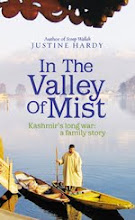 I met R. Sri Kumar when he received the Distinguished Alumni award from IIT Madras. He is the recently retired head of Karnataka police, who's taken up social transformation through e-Governance, and he believes that a lot can be achieved by combining simple project management principles with crowdsourcing.
I met R. Sri Kumar when he received the Distinguished Alumni award from IIT Madras. He is the recently retired head of Karnataka police, who's taken up social transformation through e-Governance, and he believes that a lot can be achieved by combining simple project management principles with crowdsourcing.His address to the audience was a call to action to each and everyone to do their part, for self-motivation. Towards the end of his address, he narrated the story of the Boy with the Bird In Hand.
He said he had picked up the story several years back, when he was sent on deputation to KSRTC, Karnatka's state bus corporation. In his four years with the corporation, he slowly steered it from huge losses towards profitability. And in order to achieve that, he had to visit as many employees as he could, and engage them in discussions.
Mr. Srikumar adapted the story for his purposes. When he was called upon to address groups, he used this story to drive home the point that it was up to each employee to turn the bus company (KSRTC) around.
Soon, he became known as the guy who narrated the bird story. Apparently, bus conductors and drivers would come up and request that he narrate the story to their colleagues, even though they had themselves heard it before.
Indeed, it is a story that bears repetition, even if you have heard it before. Here then, is the story that Sri Kumar narrated to the audience at IIT Madras:
Once, in a village, there lived a wise swamiji (ascetic) who always spoke the truth. Not only that, everything he said also came out to be true. The villages had enormous respect for the swamiji and revered him for his wisdom.
In the same village, there also lived two boys, brothers, who loved to play truant and stay away from school under any pretext possible. Their mother, who saw through their lies and excuses, kept telling them that they should be more like the swamiji.
This constant nagging by his mother got to the elder boy. He decided that when he got the chance, he'd show up the swamiji. And sure enough, one day the two boys found an injured sparrow by a tree. The elder boy got an idea. He was going to put the swamiji in a situation from which he couldn’t get out by speaking the truth.
"Here's what I will do," he told his brother. "I will place this bird in my hand, and cover it with my other hand. Then I will ask the swamiji whether it is alive or dead. If he says it is dead, I will open my hand and show that it is alive and that he had not spoken the truth."
"And what if he says it is alive?" asked his younger brother.
"Then I will simply crush the bird dead first, then open my hand and show that he was wrong!"
The two boys ran to the swamiji's place taking the injured bird with them.
"Swamiji, we have a question for you."
"Yes, son."
The elder boy had the bird in one hand and covered it with his other hand.
"What is in my hand, Swamiji?"
The swami took a closer look and said "It's a frightened sparrow, son."
"And swamiji," asked the boy, "is the sparrow dead or alive?"
Right away, the swamiji sensed that the boy was trying to trap him.
"Son," said the swamiji, "it's in your hands."
And that, Mr. Sri Kumar feels is ultimately the message everyone should take away. Whether it is the Karnataka State Bus Corporation, or our own company, our school, or our neighborhood or any part of our society, how things turn out is in our hands.

 Ram
Ram




